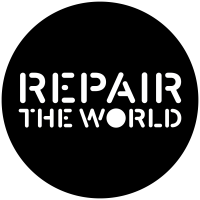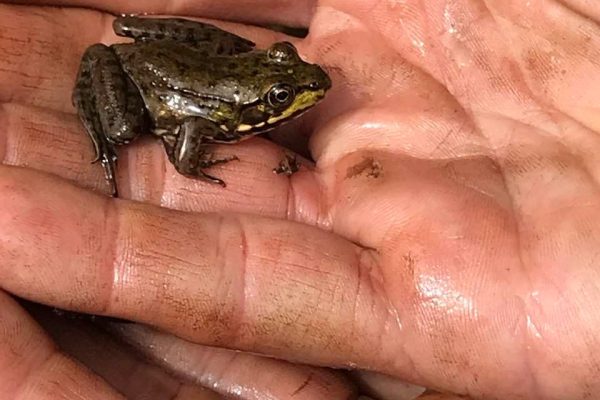“NONE OF US IS FREE UNTIL ALL OF US ARE FREE”
ITEMS NEEDED
• One pillow to pass around the table
• Copies of “Appetizer (Opening Activity): Lean In/Lean Out” handout
FRAMING
Through Passover celebrations, the Jewish people celebrate in the fact that, though our ancestors were once slaves in Egypt, we are now free. As we recline on pillows like the nobility used to, we enjoy the fact that, while we were once slaves who dined in a hurry, we are now free to enjoy ourselves.
Yet we know that we live in a world where all are not yet free. While we can and should appreciate the freedoms we enjoy, we recognize that there are still 60 million displaced people throughout the world, of whom 20 million are refugees—people who have been forced to flee their home country due to persecution because of their race, religion, nationality, political opinion or membership in a particular social group. In fact, the current refugee crisis is worse than at any time since World War II. Fleeing violence and persecution, the world’s refugees are some of the most vulnerable human beings around the globe.
Recently, there has been tremendous backlash against refugee resettlement in the United States for a variety of reasons including fear and xenophobia. There are many across the country who argue that the global refugee crisis is not their problem, that supporting refugees in their country is not their responsibility and will deplete the nation’s resources or threaten national security.
This thinking is antithetical to the message of Passover. The symbols of Passover remind us that, from scarcity, can come abundance. When the Israelites fled slavery in Egypt and had no time to bake bread, we took matzah with us. Now, as we look to the Passover seder and remember the Exodus, we are commanded to break that bread and share it to show that, as long as there are people suffering in the world, none of us is really free. While we dip our vegetables in salt water to remember the bitterness of slavery, we specifically dip karpas, a green vegetable, to represent the possibility for renewal and rebirth that can come from freedom. We eat charoset, a mix of apples, raisins, nuts, and cinnamon. Even as it symbolizes the mortar between the bricks that the Children of Israel painstakingly laid as slaves in Egypt, its ingredients are sweet to remind us that, despite the incredible difficulties we experienced, there is always the hope for sweetness, the hope for redemption.
How, then, at a season when we are challenged to remember a time when Jews found liberation might we challenge ourselves to see that we can continue to find liberation through sharing our resources with others? How can we see sharing our resources as a way of living from abundance, rather than scarcity? How can we see sharing our resources as liberation not just for refugees but also for ourselves?
When we think about the journey to freedom that the Jewish people have taken since the Exodus, we know that it has not been a short road. And, so, both because of our values and because of our history, the Jewish community has a unique role to play in supporting contemporary refugees in rebuilding their lives with abundance. Tonight’s dinner gives us the opportunity to explore the connection between the global refugee crisis and the complex narrative of Passover liberation.
HOST INSTRUCTIONS
The host should begin by reading the framing below:
Passover is the opportunity for the Jewish people to celebrate the fact that although our ancestors were once slaves in Egypt, we are now free.
But we know that all are not yet free. While we appreciate the freedoms we currently enjoy, we recognize their fragility against a disturbing reality: there are still 60 million displaced people throughout the world, 20 million of whom are refugees. In fact, the current refugee crisis is worse than at any time since World War II. Fleeing violence and persecution, the world’s refugees are some of the most vulnerable human beings around the globe.
There has been tremendous backlash recently against refugee resettlement in the United States for a variety of reasons, such as fear and xenophobia. There are many across the country who argue that the global refugee crisis is not their problem, and that welcoming refugees into their country is not their responsibility. They may even say that allowing refugees into the United States will deplete the nation’s resources or threaten national security.
This thinking is antithetical to the message of Passover. The symbols of Passover remind us that, from scarcity, can come abundance:
When the Jewish people fled slavery in Egypt and had no time to bake bread, we took matzah with us. Now, as we look to the upcoming Passover Seder and remember our Exodus, we are commanded to break that bread and share it so that we see that, as long as there are people suffering in the world, none of us is really free.
While we dip our vegetables in salt water to remember the bitterness of slavery, we specifically dip karpas, a green vegetable, to represent the possibility for renewal and rebirth that can come from freedom.
We eat charoset, a mix of apples, raisins, nuts, and cinnamon. Even as it symbolizes the mortar between the bricks that the Children of Israel painstakingly laid as slaves in Egypt, its ingredients are sweet to remind us that, despite the incredible difficulties we experienced, there is always the hope for sweetness, the hope for redemption.
How, then, at a season when we are challenged to remember a time when we found our own liberation, might we challenge ourselves to see that we can continue to find liberation through sharing our resources with others? How can we see sharing our resources as a way of living from abundance, rather than scarcity? How can we see sharing our resources as liberation not just for the refugees but also for ourselves?
When we think about the journey to freedom that the Jewish people have taken since the Exodus, we know that it has not been a short road. And, so, both because of our values and because of our history, the Jewish community has a unique role to play in supporting contemporary refugees in rebuilding their lives with abundance. Tonight’s dinner gives us the opportunity to explore the connection between the global refugee crisis and the complex narrative of Passover liberation.
Next, the host should share the following with guests:
Traditionally at the Passover seder we recline on pillows like nobility used to, to show that while we were once slaves who ate hurriedly, we are now free to dine leisurely and enjoy ourselves. In our conversation tonight we are holding both scarcity and abundance—the idea that both can coexist—and we have to get from one to the other. To do that, rather than recline the way we usually would at a Passover Seder, tonight, we are all going to lean into what might be a difficult conversation.
Instead of sitting back on a pillow and comfortably leaning out of the conversation, we are now going to pass around a pillow and each take a turn placing it behind the person sitting next to us so that, together, we can all lean into the productive discomfort—the space where change starts to occur—for the conversation we are about to have together.
While you lean in, think silently about one intention you have for your own participation in tonight’s conversation.
After the group has finished leaning in, pass out the “Appetizer (Opening Activity): Lean In/Lean Out” handouts, pose the following questions to the group, and have everyone find a partner to answer the following questions. Remind guests to first introduce themselves to each other.
When is a time in your own life when you have experienced abundance coming out of scarcity, when less was actually more or when less became more?
How did that experience enrich your life in positive ways?
Were there ways that experience was still difficult, painful, or scary?
Bring the group back and thank everyone for sharing.
 Turn the Tables is a program created by Repair the World.
Turn the Tables is a program created by Repair the World.
Repair the World works to inspire American Jews and their communities to give their time and effort to the causes they are passionate about. We aim to make service a defining part of American Jewish life.










